Commons eID Client
This artifact holds the actual PC/SC based eID code. This artifact has no other dependencies so it can be used within lightweight web browser components.
Blocking until the user has inserted/removed their eID
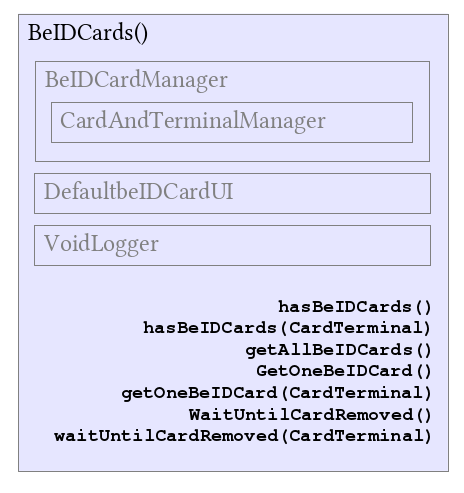
BeIDCards Instance with default internal Logger and UI.Instantiate one BeIDCards object with the default constructor. Call its getOneBeIDCard() method. This will block until a cardterminal is connected and an eID card has been inserted into it, and then return a BeIDCard instance connected to that eID card.
On a system with a graphical display, a DefaultBeIDCardsUI will internally be instantiated (if that class is on the classpath) and used to display dialogs if and when required. For example, to ask the user to attach a card terminal if none is attached, to insert an eID if none is present, or to choose from several eID cards if several are present at time of call.
Once you have obtained a BeIDCard object, the same BeIDCards instance allows you to block waiting for the user to remove that eID card.
Several methods in BeIDCards take an optional argument "CardTerminal": In situations with multiple card readers, this allows you to limit the call to that particular card reader.
Logging
Most classes in commons-eid take an optional Logger instance as a constructor argument. It is recommended for all non-trivial applications, to pass one's own Logger, and allow capture of such events, to allow diagnostics/debugging.
Custom User Interface for Blocking API
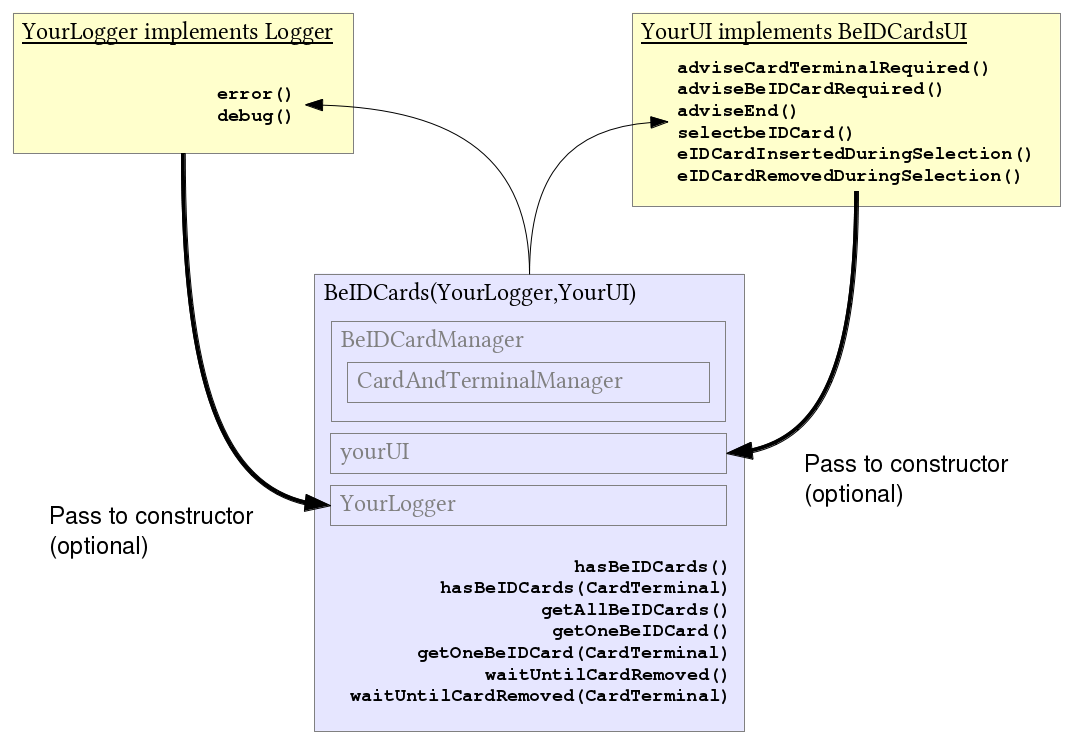
BeIDCards Instance with default internal Logger and UI.The BeIDCards constructor takes, apart from the ubiquitous Logger, a BeIDCardsUI argument.
Pass an instance implementing BeIDCardsUI to override the default on-screen UI with whatever interface is appropriate to your application. You might extend BeIDCardsUIAdapter to have less code clutter if you don't need to implement all the methods. For example, if you're an embedded application with one fixed card terminal, adviseCardTerminalRequired, selectBeIDCard, etc.. will never be called, since there will always be a card terminal and never more than one.
Getting called when the user inserts/removes their eID
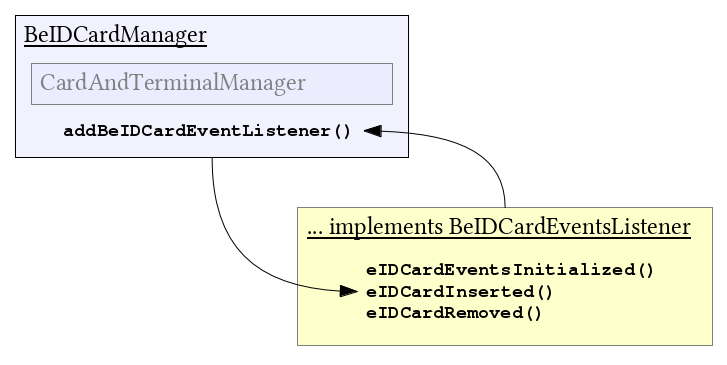
BeIDCardManager- Instantiate a
BeIDCardManagerusing the default constructor. - Instantiate your implementation of
BeIDCardEventsListener - call the
BeIDCardManager'saddBeIDCardListener, passing yourBeIDCardEventsListener. - Call your
BeIDCardManager'sstart()method.Your
BeIDCardListenerswill get the following calls:
eIDCardInserted()for every eID Card present at time start() was calledeIDCardEventsInitialised, onceeIDCardInsertedfor every eID card subsequently insertedeIDCardRemovedfor every eID card subsequently removed
Getting called when the user inserts/removes their eID or other Smart Cards
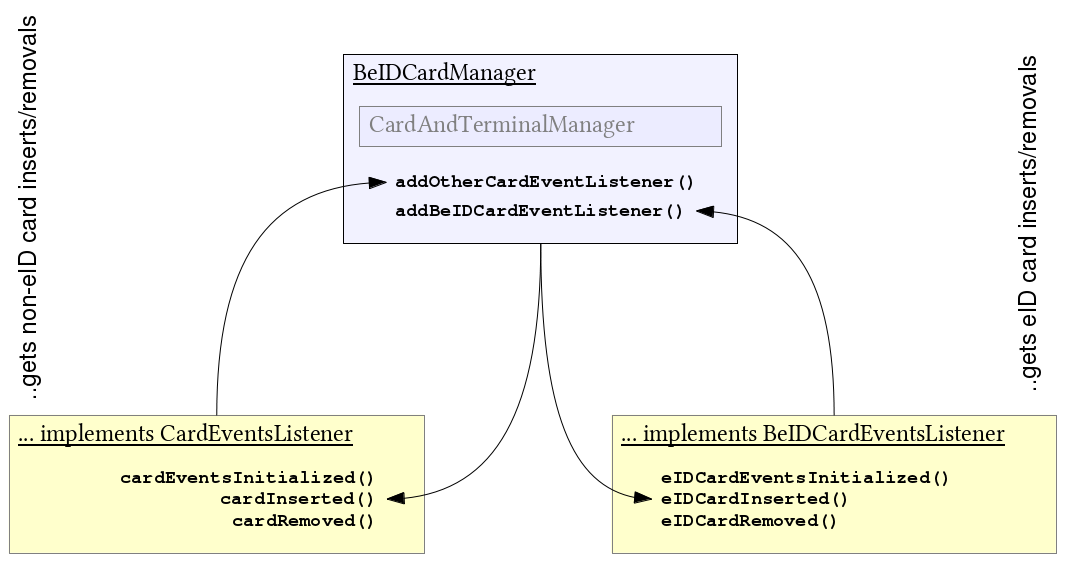
BeIDCardManager can also detect other Smart CardsIn the same way that you can register BeIDCardEventsListener instances with a BeIDCardManager, you can also register CardEventsListener instances using the BeIDCardEventsListener addOtherCardListener() method. The methods of these instances will be called for insert/remove events of non-eID cards. You might use this to handle other card types or to alert the user about non-supported card types.
The BeIDCardManager constructor takes 2 optional arguments: a Logger and a CardAndTerminalManager.
Pass an instance implementing Logger to get all the internal events involved in detecting cardterminals and cards. It is recommended for all non-trivial applications, to pass one's own Logger, and allow capture of such events, to allow diagnostics/debugging.
Pass an instance of CardAndTerminalManager for the BeIDCardManager to use this instead of creating its own private instance. This is useful to get control of how and when terminals and cards are detected, or to avoid 2 CardAndTerminalManagers having to be created if you also want the notification of terminal attaches/detaches that CardAndTerminalManager offers. See below.
Getting called when the user attaches/detaches card terminals or inserts/removes Smart Cards
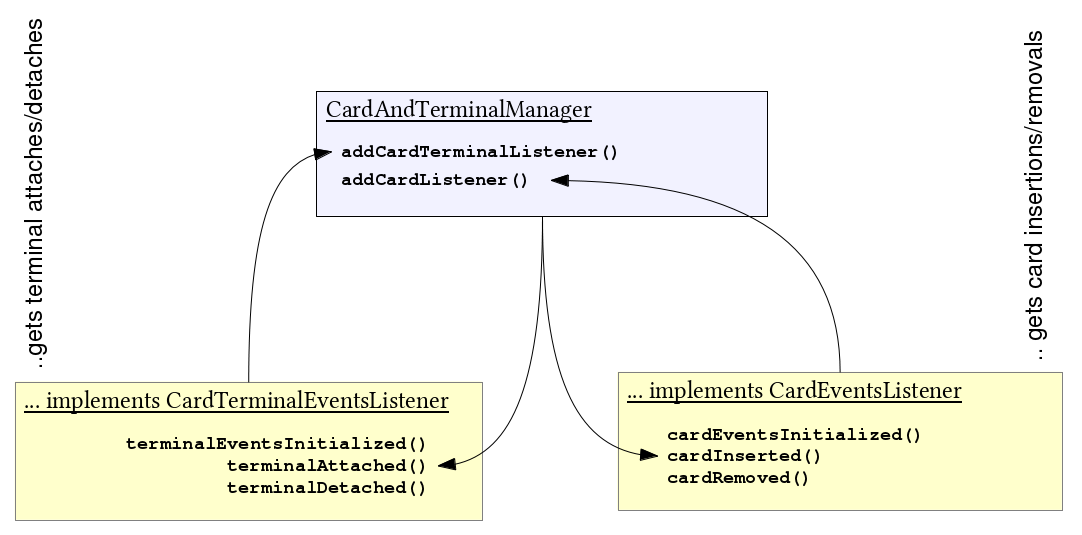
CardAndTerminalManagerInstantiate a CardAndTerminalmanager using the default constructor, register CardTerminalEventListeners to get terminal attach/detach notifications, register CardEventListeners to get card insert/remove notifications. Note that the latter will notify for any type of smart cards, if you want to only detect BeID cards, consider using a BeIDCardManager instead.
Getting called for BeID and Other cards, and Terminal Attaches/Detaches
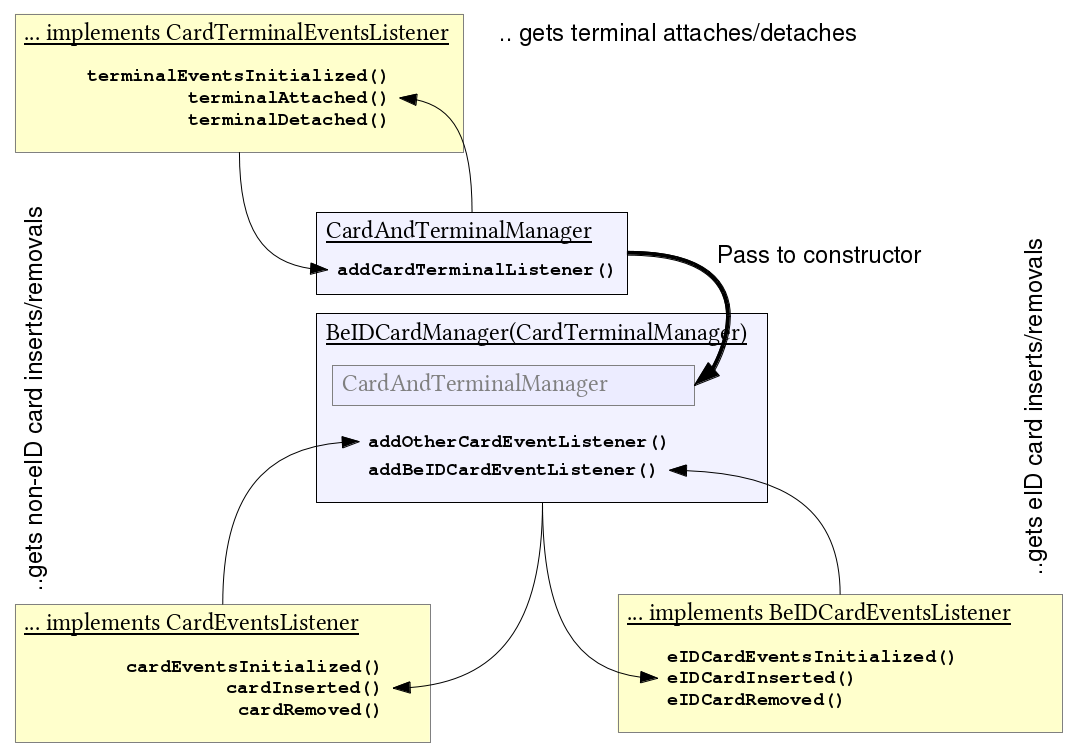
The patterns above may be combined to get separate notifications for:
CardTerminals being attached/detached- BeID Cards being inserted/removed
- Other smart cards being inserted/removed
Instantiate your own
CardAndTerminalManager, pass it to yourBeIDCardsManager's constructor. RegisterCardTerminalEventListenerinstances with yourCardAndTerminalManagerto get attach/detach events,BeIDCardEventsListeners and/orCardEventsListeners with yourBeIDCardsManagerto get BeID insert/remove and insert/remove events for other cards, resp. Callstart()on yourCardAndTerminalManager. There is no need tostart()theBeIDCardManager, in this case (it has no effect)Note that
CardEventsListeners may either be registered with aBeIDCardsManageror with aCardAndTerminalManager. The difference being that those registered with aCardAndTerminalManagerwill see events for all smart cards, BeID or not, while those registered with aBeIDCardManagerwill only see events for non-BeID cards (BeID cards being reported toBeIDCardListenerinstances)
Example Code:
The commons-eid-tests package has some example code snippets, in src/main/java (the unit tests are in src/test/java).

